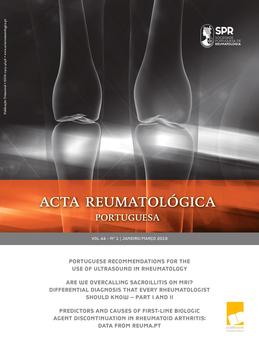Predictors and causes of first-line biologic agent discontinuation in rheumatoid arthritis: data from Reuma.pt
Authors
Joao Lagoas Gomes; Alexandre Sepriano; Mónica Eusébio; Sofia Serra; João Eurico Fonseca; Maira João Saavedra; Luís Cunha-Miranda; Cândida Silva; Miguel Bernardes; Diana Rosa-Gonçalves; José Costa; Walter Castelão; Jaime Cunha Branco; Maria José Santos;
Objectives: To assess the discontinuation of first-line biological treatment and to evaluate the reasons and predictors thereof in patients with rheumatoid arthritis (RA) from daily clinical practice.
Methods: RA patients registered in the Rheumatic Diseases Portuguese Register (Reuma.pt) starting treatment with biologic DMARDs (bDMARDs) were included in this prospective observational study. The main outcome was the time to discontinuation (in years) due to any cause. Discontinuation was defined as a 90-day discontinuation of treatment or the occurrence of any switch to another bDMARD during follow-up. Baseline and time-varying sociodemographic and clinical characteristics were tested as possible predictors of discontinuation using multivariable Cox models.
Results: Of the 1,851 RA patients included in the study, 871 (47%) discontinued their first bDMARD. The median overall persistence of the first bDMARD was 5.5 years and the leading cause of discontinuation was inefficacy [N=476 (55%)], followed by adverse events [N=262 (30%)], other causes [N=69, (8%)] and unknown causes [N=64 (7%)]. Patients with a higher HAQ score (more disability) at baseline were more likely to discontinue their first bDMARD [hazard ratio (HR):1.39 (95% CI: 1.17-1.64)], as were patients with a higher number of comorbidities [HR: 1.17 (1.05-1.29)] and patients starting treatment from 2007 onwards [HR:1.89 (1.5-2.38)]. On the contrary, receiving TNFi bDMARD [HR:0.74 (0.57-0.94)] as opposed to non-TNFi was associated with less discontinuation. Expectedly, the higher the DAS28 during follow-up the higher the likelihood to discontinue bDMARD [HR:1.08 (1.06-1.1)]. No other time-varying predictor was found.
Conclusion: In the Portuguese RA population, maintenance of first-line bDMARD was shown to be relatively high. Inefficacy was the leading cause of discontinuation. Features found to predict drug discontinuation (e.g. baseline disability) may contribute to inform clinician’s decisions in clinical practice.
Joao Lagoas Gomes
Centro Hospitalar de Lisboa Ocidental- Hospital Egas Moniz; CEDOC / NOVA Medical School, Nova University of Lisbon
Alexandre Sepriano
NOVA Medical School, Nova University of Lisbon, Rheumatology / Leiden University Medical Center.
Mónica Eusébio
Sofia Serra
Centro Hospitalar de Lisboa Ocidental- Hospital Egas Moniz
João Eurico Fonseca
Hospital de Santa Maria (CHLN), Lisbon Academic Medical Centre, Unidade de Investigação em Reumatologia, Instituto de Medicina Molecular, Faculdade de Medicina da Universidade de Lisboa
Maira João Saavedra
Hospital de Santa Maria (CHLN), Lisbon Academic Medical Centre
Luís Cunha-Miranda
Instituto Português de Reumatologia
Cândida Silva
Instituto Português de Reumatologia
Miguel Bernardes
Centro Hospitalar de São João
Diana Rosa-Gonçalves
Centro Hospitalar de São João
José Costa
Unidade Local de Saúde do Alto Minho
Walter Castelão
Centro Hospitalar de Lisboa Ocidental- Hospital Egas Moniz
Jaime Cunha Branco
Centro Hospitalar de Lisboa Ocidental- Hospital Egas Moniz; CEDOC / NOVA Medical School, Nova University of Lisbon
Maria José Santos
Hospital Garcia de Orta
Centro Hospitalar de Lisboa Ocidental- Hospital Egas Moniz; CEDOC / NOVA Medical School, Nova University of Lisbon
Alexandre Sepriano
NOVA Medical School, Nova University of Lisbon, Rheumatology / Leiden University Medical Center.
Mónica Eusébio
Sofia Serra
Centro Hospitalar de Lisboa Ocidental- Hospital Egas Moniz
João Eurico Fonseca
Hospital de Santa Maria (CHLN), Lisbon Academic Medical Centre, Unidade de Investigação em Reumatologia, Instituto de Medicina Molecular, Faculdade de Medicina da Universidade de Lisboa
Maira João Saavedra
Hospital de Santa Maria (CHLN), Lisbon Academic Medical Centre
Luís Cunha-Miranda
Instituto Português de Reumatologia
Cândida Silva
Instituto Português de Reumatologia
Miguel Bernardes
Centro Hospitalar de São João
Diana Rosa-Gonçalves
Centro Hospitalar de São João
José Costa
Unidade Local de Saúde do Alto Minho
Walter Castelão
Centro Hospitalar de Lisboa Ocidental- Hospital Egas Moniz
Jaime Cunha Branco
Centro Hospitalar de Lisboa Ocidental- Hospital Egas Moniz; CEDOC / NOVA Medical School, Nova University of Lisbon
Maria José Santos
Hospital Garcia de Orta





